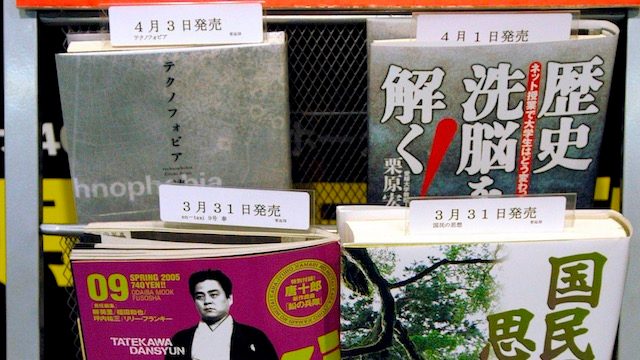SUMMARY
This is AI generated summarization, which may have errors. For context, always refer to the full article.

TOKYO, Japan – Japan on Tuesday, April 7, rebuffed neighboring countries’ protests over newly-approved textbooks after complaints about references to disputed territory and their bitter shared history.
The education ministry announced on Monday, April 6, that all 18 new social studies textbooks for use in junior high schools assert Japanese ownership of two separate island groups at the centre of disputes with China and South Korea.
New school books also swap the word “massacre” when referring to the mass-slaughter of Chinese civilians in Nanjing in 1937, preferring the term “incident”.
The textbook row surfaces regularly in the 3-way row over events in the first half of the 20th century, when Japan invaded and occupied large tracts of mainland Asia.
But it has come at a particularly sensitive time, as the region readies to mark the 70th anniversary of the end of World War II and with a rising tide of nationalism in all 3 countries.
Immediately after Monday’s announcement, the South Korean foreign ministry summoned Japanese Ambassador Koro Bessho to protest over the textbooks.
“The Japanese government carried out another provocation by approving school textbooks that strengthen unfair claims over our territory,” Seoul’s foreign ministry said in a statement.
Tokyo and Seoul are at odds over the sovereignty of a pair of sparsely-inhabited rocks in waters between them, administered by Seoul as Dokdo but claimed as Takeshima in Japan.
“This clearly shows that the Japanese government seeks to inculcate the distorted views on history and territory into the minds of the young generation and tries to repeat the wrongs it committed in the past,” it said.
In Tokyo, Chief Cabinet Secretary Yoshihide Suga flatly rejected those claims.
“Our country’s textbook screening is carried out impartially and neutrally, based on professional and academic deliberations,” Suga told a news conference.
“Since our country’s stance on Takeshima and history recognition have been consistent, we responded to (South Korea) by saying we cannot accept their protest,” Japan’s top government spokesman said.
China’s official Xinhua News agency said historical revisionism was laid bare in the textbooks, revised “in line with the country’s increasingly right-leaning politics” under the premiership of Shinzo Abe.
Xinhua noted that some textbooks stated that “captives and civilians were involved in” the Nanjing Massacre. It said this contrasted with earlier textbooks that said the Japanese Army “killed many captives and civilians.”
A Japanese education ministry official confirmed that one of the new history textbooks did not refer to the mass killing in Nanjing, while “many others have described it as an incident, not a massacre”.
China says 300,000 civilians and soldiers died in a spree of killing, rape and destruction in the six weeks after the Japanese military entered the then-capital on December 13, 1937.
While some foreign academics put the number of deaths lower, no mainstream respected historians dispute there was a massacre.
Separately, on Tuesday, Japan issued its annual “blue book” on foreign policies, saying: “The starting point of Japan’s coherent path as a peaceful nation is our pledge not to fight a war again and keep peace based on our deep remorse over the past war.” – Shingo Ito, AFP / Rappler.com
Add a comment
How does this make you feel?
There are no comments yet. Add your comment to start the conversation.